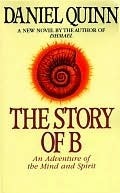More on this book
Community
Kindle Notes & Highlights
by
Daniel Quinn
Read between
July 20 - August 5, 2025
We began to grow more rapidly because we’d found a way to defeat the negative feedback controls of the community. We’d become food producers—agriculturalists. In other words, we’d found a way to increase food availability at will
Population expansion among agriculturalists was followed by territorial expansion among agriculturalists. Territorial expansion made more land available for food production—and no one goes into farming to reduce food production. More land, more food production, more population growth.
Nonetheless—and this is the point that ecology makes and that I’ve made here today—our behavior as a biological population is indistinguishable from the behavior of any other biological population.
This fact seems to be offered as proof that human societies are not subject to the laws of ecology, which (it is assumed) predict that the more food the faster the growth. But this is not what ecology predicts. Let me repeat that: Ecology does not predict that the population in a food-rich area will grow more rapidly than the population in a food-poor area. What ecology predicts is: When more food is made available, the population will increase.
Birth control is a strategy aimed at effects. Food-production control is a strategy aimed at causes.
Thomas Malthus,
the Great Forgetting blinds us to the fact that we are a biological species in a community of biological species and are not exempt or exemptible from the forces that shape all life on this planet.
The Tak had the remarkable and unprecedented idea that everyone should live the way they lived. It’s impossible to exaggerate how unusual this made them. I can’t name a single other people in history who made it a goal to proselytize their neighbors.
Tribal peoples have their full share of suffering to do, but in the tribal life, no one suffers unless everyone suffers. There’s no class or group of people who are expected to do the suffering—and no class or group of people who are exempt from suffering.
Why should you be surprised that natural selection organized people in a way that worked well for people?
The very first thing to go was the very thing that made tribal life a success: its social, economic, and political egalitarianism. As soon as our revolution began, the process of division began, between rulers and ruled, rich and poor, powerful and powerless, masters and slaves. The suffering class had arrived, and that class (as it would always be) was the masses.
You can make people live like cattle, but you can’t make them think they’re living well. You can render them powerless, but you can’t render them dreamless. The suffering masses knew they were suffering—knew something was desperately wrong—knew they needed something. And what they needed was salvation.
each had its own theory about the origin and cause of human suffering and its own approach to ending it, transcending it, or putting up with it. But all were united in a single, central vision: Whether it’s release from the endless round of death and rebirth or blissful union with God in heaven, salvation is the highest goal of human life, unimaginably beyond any other, such as wealth, happiness, honor, or fame—and each of us is utterly alone in the universe with it.
‘The world must live, the world must live! We are only one species among billions. The gods don’t love us more than they love spiders or bears or whales or water lilies. The age of the Great Forgetting has ended, and all its lies and delusions have been dispelled. Now we remember who we are. Our kin are not cherubim, seraphim, thrones, principalities, and powers. Our kin are mayflies, lemurs, snakes, eagles, and badgers. The blinding we suffered in the Great Forgetting has abated, so we no longer imagine that Man was ill-made. We no longer imagine that the gods botched their work when it came
...more


